Database Developer Resume Examples

Aug 27, 2024
|
12 min read
Craft a standout database developer resume: Your roadmap to impressing tech recruiters with your technical skills, project achievements, and SQL prowess. Get your next role with our expert tips and detailed checklist.
Rated by 348 people
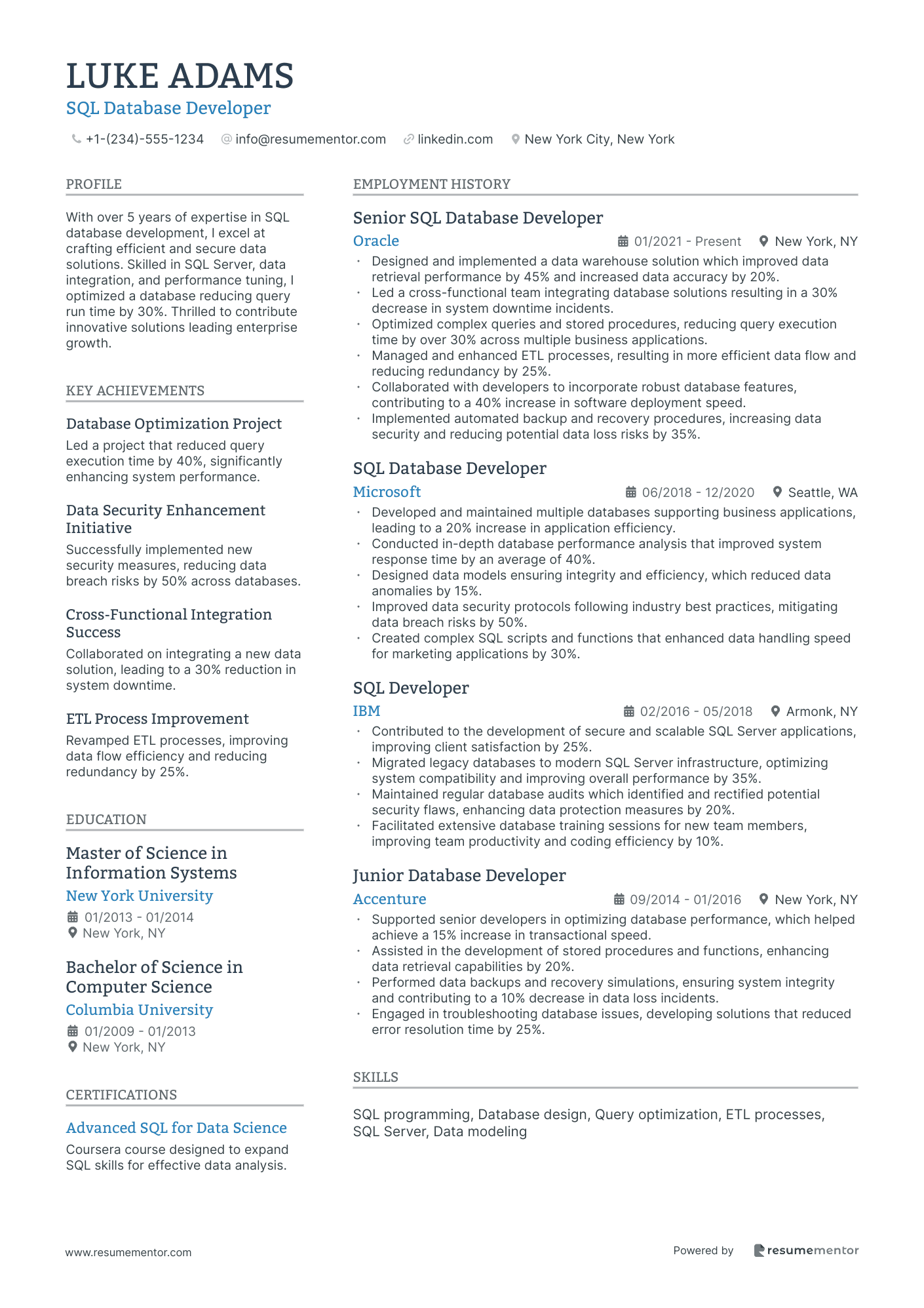
SQL Database Developer
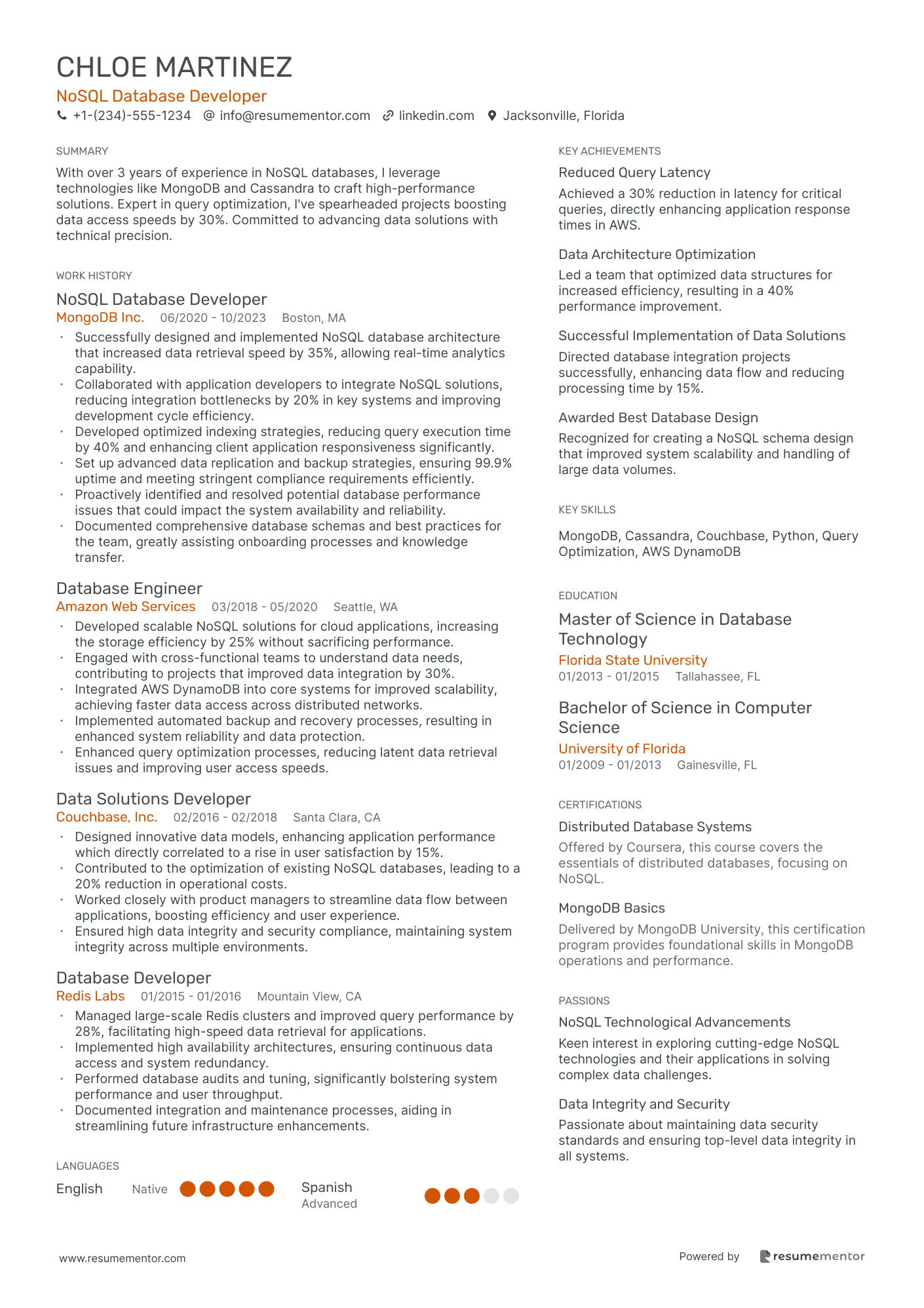
NoSQL Database Developer
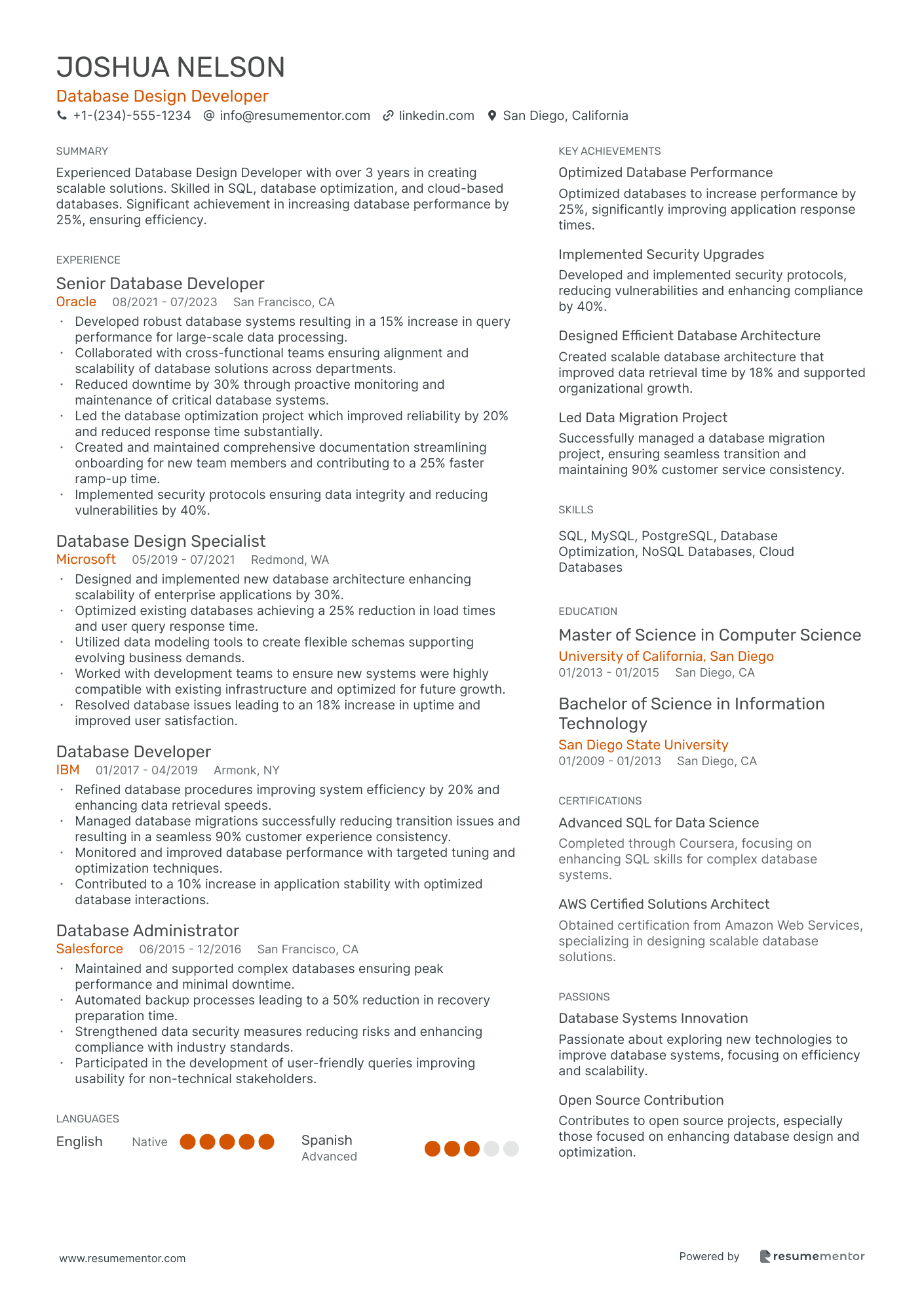
Database Design Developer
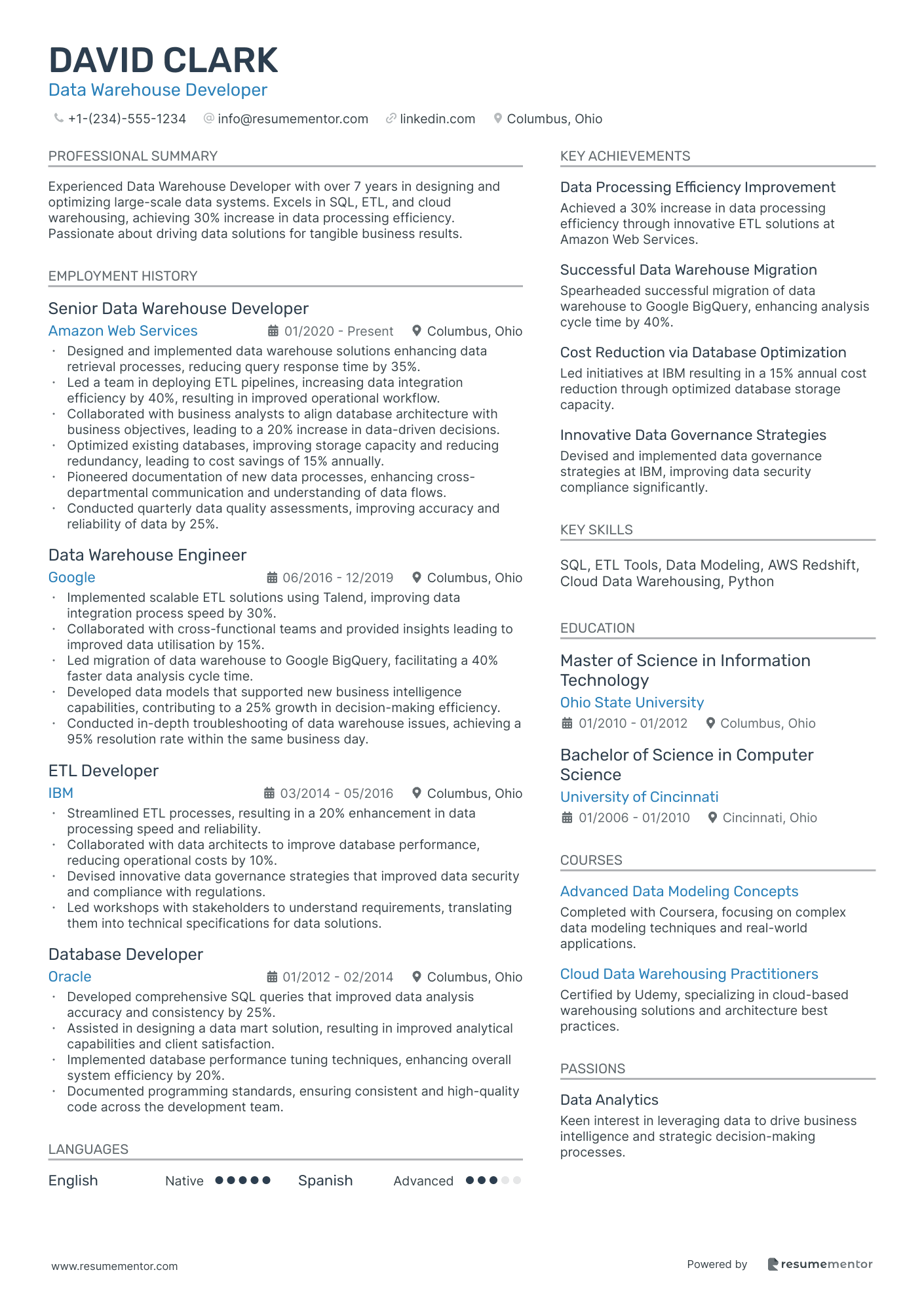
Data Warehouse Developer
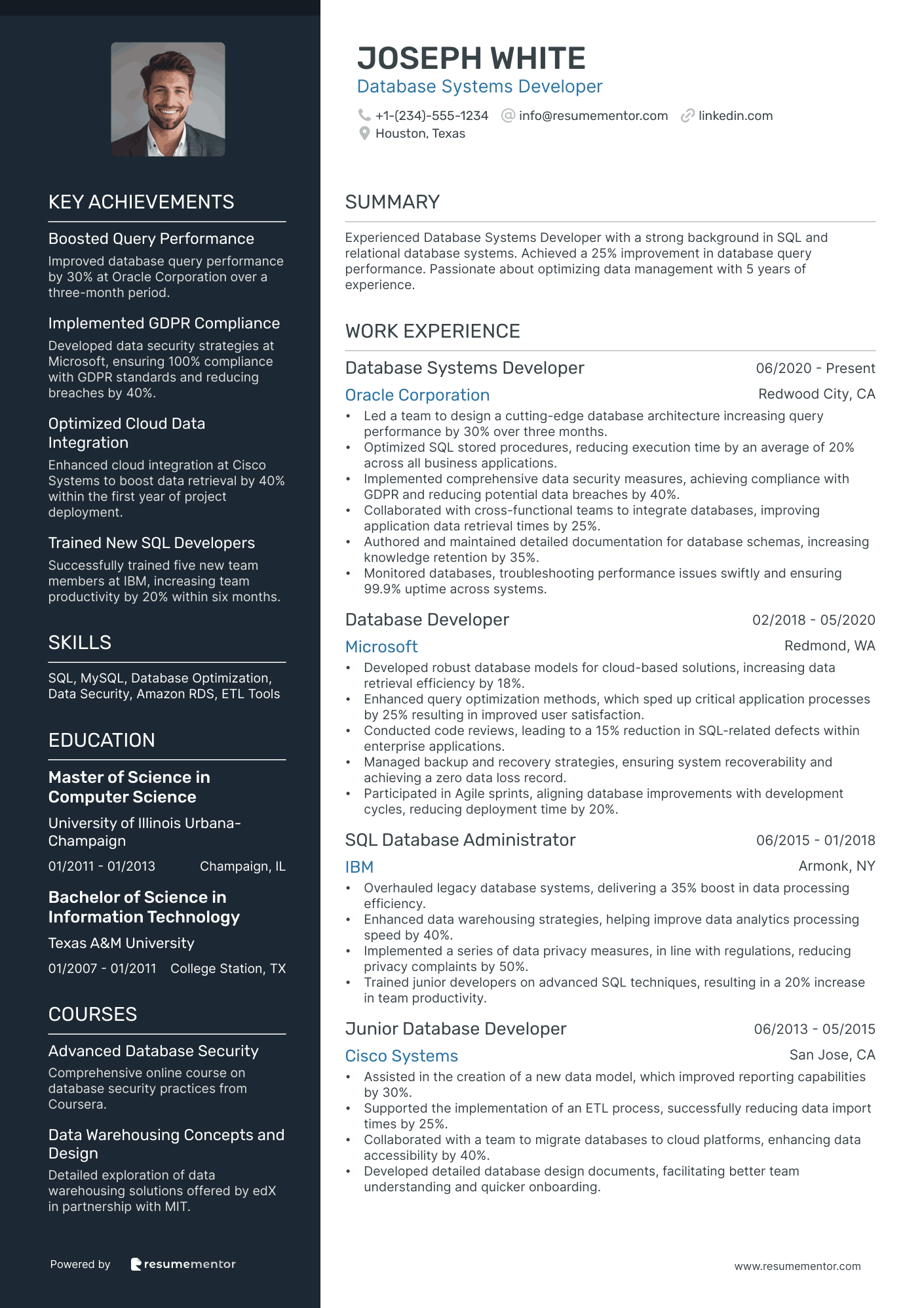
Database Systems Developer
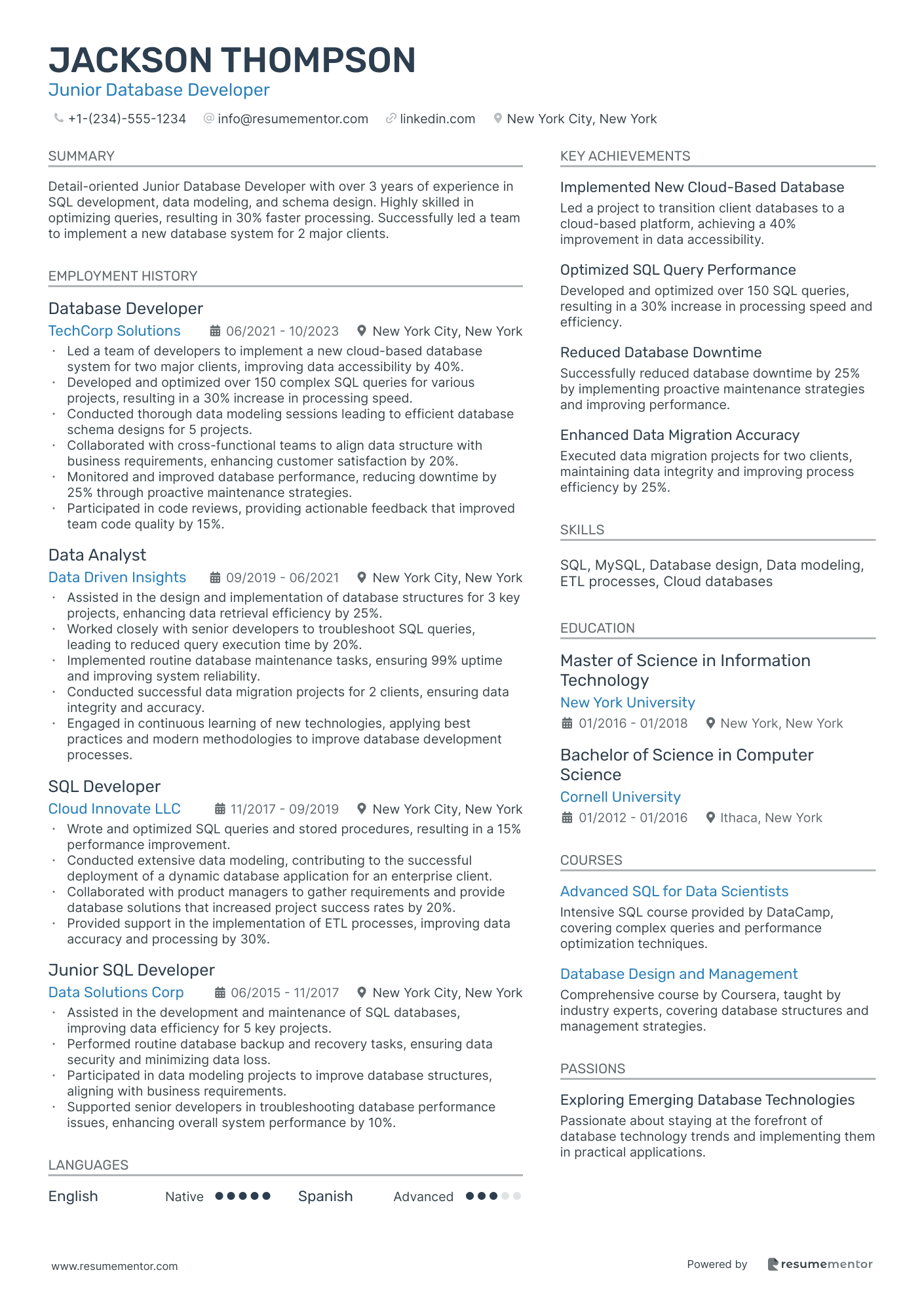
Junior Database Developer
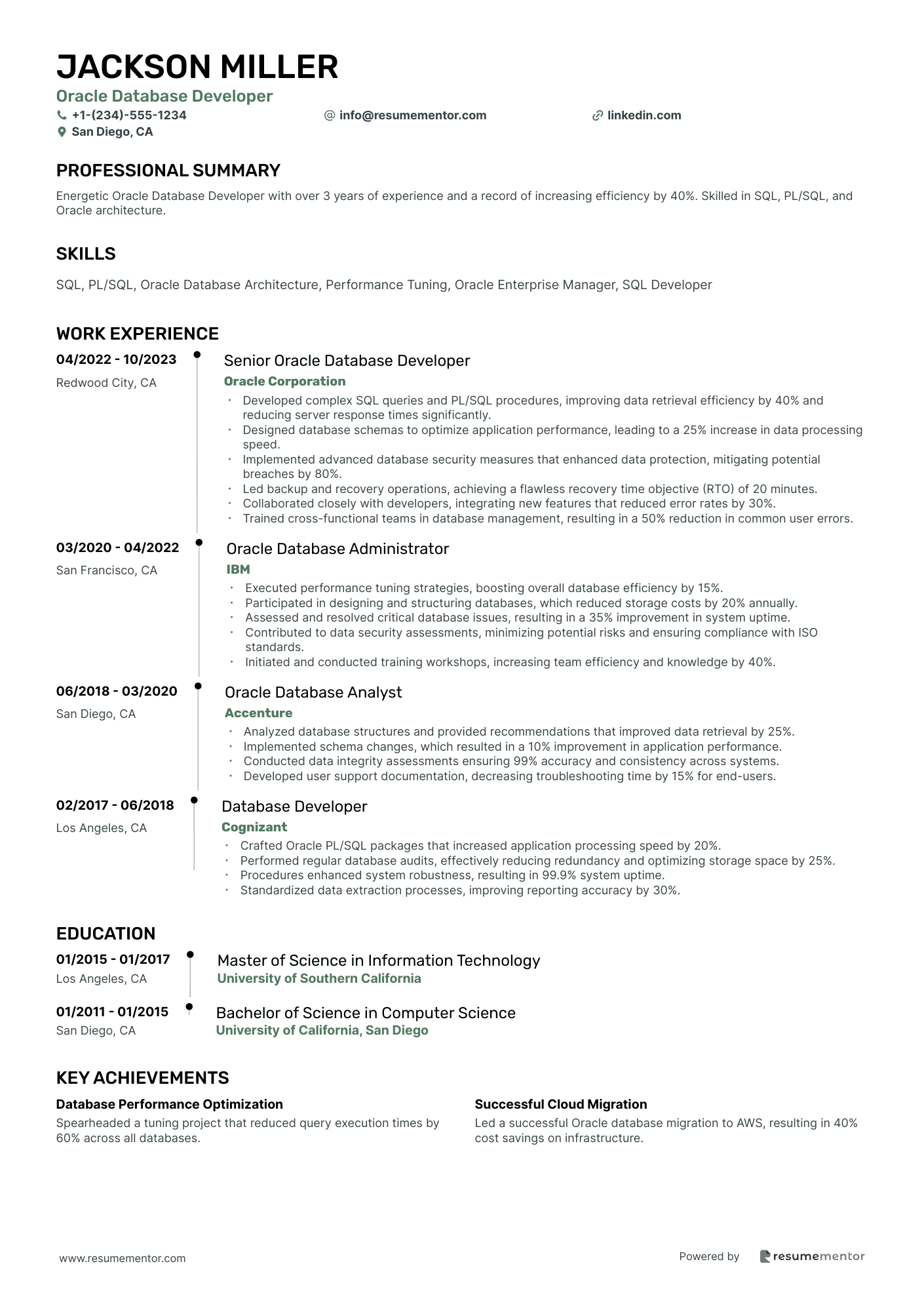
Oracle Database Developer
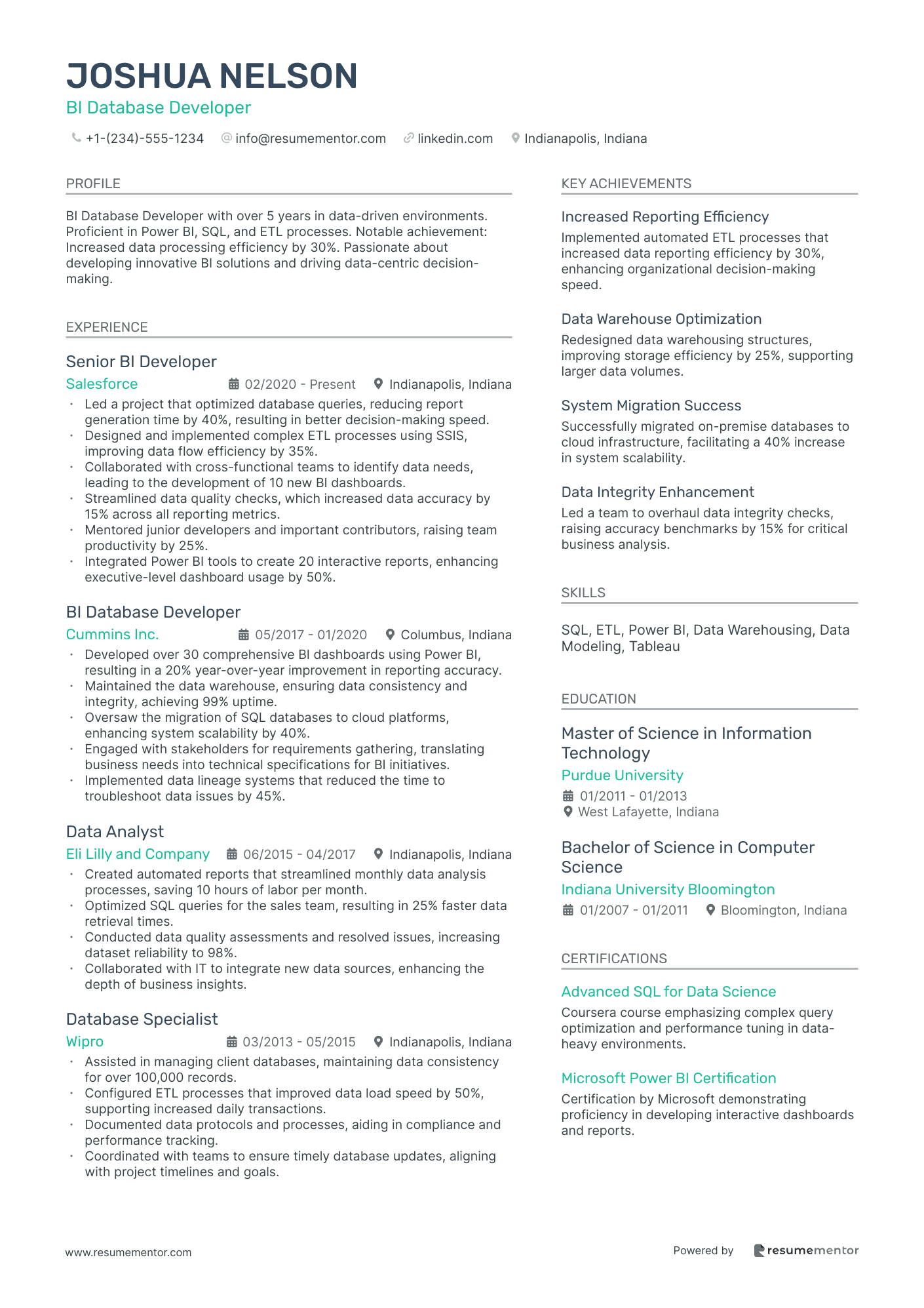
BI Database Developer
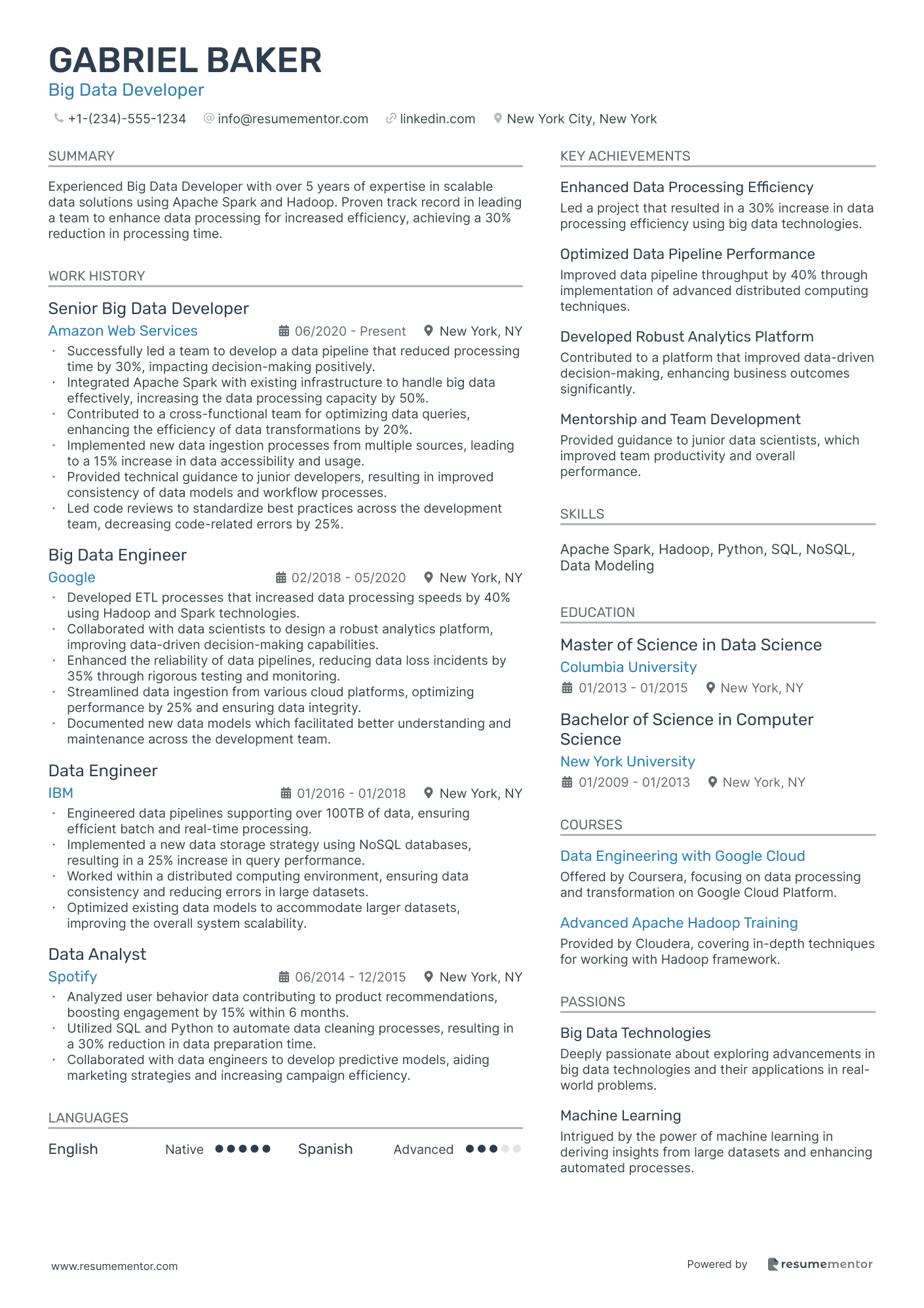
Big Data Developer
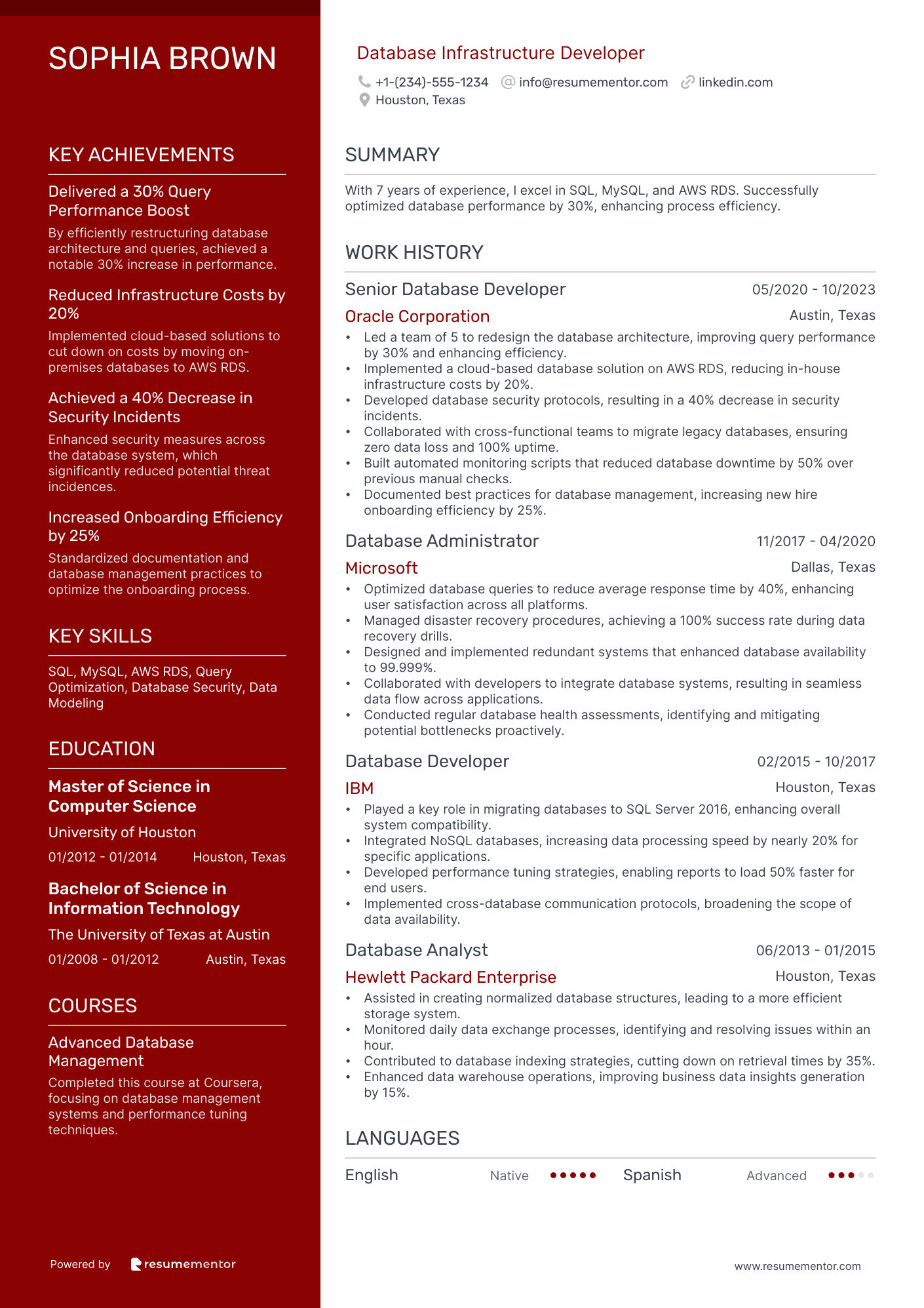
Database Infrastructure Developer

SQL Database Developer resume sample
- •Designed and implemented a data warehouse solution which improved data retrieval performance by 45% and increased data accuracy by 20%.
- •Led a cross-functional team integrating database solutions resulting in a 30% decrease in system downtime incidents.
- •Optimized complex queries and stored procedures, reducing query execution time by over 30% across multiple business applications.
- •Managed and enhanced ETL processes, resulting in more efficient data flow and reducing redundancy by 25%.
- •Collaborated with developers to incorporate robust database features, contributing to a 40% increase in software deployment speed.
- •Implemented automated backup and recovery procedures, increasing data security and reducing potential data loss risks by 35%.
- •Developed and maintained multiple databases supporting business applications, leading to a 20% increase in application efficiency.
- •Conducted in-depth database performance analysis that improved system response time by an average of 40%.
- •Designed data models ensuring integrity and efficiency, which reduced data anomalies by 15%.
- •Improved data security protocols following industry best practices, mitigating data breach risks by 50%.
- •Created complex SQL scripts and functions that enhanced data handling speed for marketing applications by 30%.
- •Contributed to the development of secure and scalable SQL Server applications, improving client satisfaction by 25%.
- •Migrated legacy databases to modern SQL Server infrastructure, optimizing system compatibility and improving overall performance by 35%.
- •Maintained regular database audits which identified and rectified potential security flaws, enhancing data protection measures by 20%.
- •Facilitated extensive database training sessions for new team members, improving team productivity and coding efficiency by 10%.
- •Supported senior developers in optimizing database performance, which helped achieve a 15% increase in transactional speed.
- •Assisted in the development of stored procedures and functions, enhancing data retrieval capabilities by 20%.
- •Performed data backups and recovery simulations, ensuring system integrity and contributing to a 10% decrease in data loss incidents.
- •Engaged in troubleshooting database issues, developing solutions that reduced error resolution time by 25%.
NoSQL Database Developer resume sample
- •Successfully designed and implemented NoSQL database architecture that increased data retrieval speed by 35%, allowing real-time analytics capability.
- •Collaborated with application developers to integrate NoSQL solutions, reducing integration bottlenecks by 20% in key systems and improving development cycle efficiency.
- •Developed optimized indexing strategies, reducing query execution time by 40% and enhancing client application responsiveness significantly.
- •Set up advanced data replication and backup strategies, ensuring 99.9% uptime and meeting stringent compliance requirements efficiently.
- •Proactively identified and resolved potential database performance issues that could impact the system availability and reliability.
- •Documented comprehensive database schemas and best practices for the team, greatly assisting onboarding processes and knowledge transfer.
- •Developed scalable NoSQL solutions for cloud applications, increasing the storage efficiency by 25% without sacrificing performance.
- •Engaged with cross-functional teams to understand data needs, contributing to projects that improved data integration by 30%.
- •Integrated AWS DynamoDB into core systems for improved scalability, achieving faster data access across distributed networks.
- •Implemented automated backup and recovery processes, resulting in enhanced system reliability and data protection.
- •Enhanced query optimization processes, reducing latent data retrieval issues and improving user access speeds.
- •Designed innovative data models, enhancing application performance which directly correlated to a rise in user satisfaction by 15%.
- •Contributed to the optimization of existing NoSQL databases, leading to a 20% reduction in operational costs.
- •Worked closely with product managers to streamline data flow between applications, boosting efficiency and user experience.
- •Ensured high data integrity and security compliance, maintaining system integrity across multiple environments.
- •Managed large-scale Redis clusters and improved query performance by 28%, facilitating high-speed data retrieval for applications.
- •Implemented high availability architectures, ensuring continuous data access and system redundancy.
- •Performed database audits and tuning, significantly bolstering system performance and user throughput.
- •Documented integration and maintenance processes, aiding in streamlining future infrastructure enhancements.
Database Design Developer resume sample
- •Developed robust database systems resulting in a 15% increase in query performance for large-scale data processing.
- •Collaborated with cross-functional teams ensuring alignment and scalability of database solutions across departments.
- •Reduced downtime by 30% through proactive monitoring and maintenance of critical database systems.
- •Led the database optimization project which improved reliability by 20% and reduced response time substantially.
- •Created and maintained comprehensive documentation streamlining onboarding for new team members and contributing to a 25% faster ramp-up time.
- •Implemented security protocols ensuring data integrity and reducing vulnerabilities by 40%.
- •Designed and implemented new database architecture enhancing scalability of enterprise applications by 30%.
- •Optimized existing databases achieving a 25% reduction in load times and user query response time.
- •Utilized data modeling tools to create flexible schemas supporting evolving business demands.
- •Worked with development teams to ensure new systems were highly compatible with existing infrastructure and optimized for future growth.
- •Resolved database issues leading to an 18% increase in uptime and improved user satisfaction.
- •Refined database procedures improving system efficiency by 20% and enhancing data retrieval speeds.
- •Managed database migrations successfully reducing transition issues and resulting in a seamless 90% customer experience consistency.
- •Monitored and improved database performance with targeted tuning and optimization techniques.
- •Contributed to a 10% increase in application stability with optimized database interactions.
- •Maintained and supported complex databases ensuring peak performance and minimal downtime.
- •Automated backup processes leading to a 50% reduction in recovery preparation time.
- •Strengthened data security measures reducing risks and enhancing compliance with industry standards.
- •Participated in the development of user-friendly queries improving usability for non-technical stakeholders.
Data Warehouse Developer resume sample
- •Designed and implemented data warehouse solutions enhancing data retrieval processes, reducing query response time by 35%.
- •Led a team in deploying ETL pipelines, increasing data integration efficiency by 40%, resulting in improved operational workflow.
- •Collaborated with business analysts to align database architecture with business objectives, leading to a 20% increase in data-driven decisions.
- •Optimized existing databases, improving storage capacity and reducing redundancy, leading to cost savings of 15% annually.
- •Pioneered documentation of new data processes, enhancing cross-departmental communication and understanding of data flows.
- •Conducted quarterly data quality assessments, improving accuracy and reliability of data by 25%.
- •Implemented scalable ETL solutions using Talend, improving data integration process speed by 30%.
- •Collaborated with cross-functional teams and provided insights leading to improved data utilisation by 15%.
- •Led migration of data warehouse to Google BigQuery, facilitating a 40% faster data analysis cycle time.
- •Developed data models that supported new business intelligence capabilities, contributing to a 25% growth in decision-making efficiency.
- •Conducted in-depth troubleshooting of data warehouse issues, achieving a 95% resolution rate within the same business day.
- •Streamlined ETL processes, resulting in a 20% enhancement in data processing speed and reliability.
- •Collaborated with data architects to improve database performance, reducing operational costs by 10%.
- •Devised innovative data governance strategies that improved data security and compliance with regulations.
- •Led workshops with stakeholders to understand requirements, translating them into technical specifications for data solutions.
- •Developed comprehensive SQL queries that improved data analysis accuracy and consistency by 25%.
- •Assisted in designing a data mart solution, resulting in improved analytical capabilities and client satisfaction.
- •Implemented database performance tuning techniques, enhancing overall system efficiency by 20%.
- •Documented programming standards, ensuring consistent and high-quality code across the development team.
Database Systems Developer resume sample
- •Led a team to design a cutting-edge database architecture increasing query performance by 30% over three months.
- •Optimized SQL stored procedures, reducing execution time by an average of 20% across all business applications.
- •Implemented comprehensive data security measures, achieving compliance with GDPR and reducing potential data breaches by 40%.
- •Collaborated with cross-functional teams to integrate databases, improving application data retrieval times by 25%.
- •Authored and maintained detailed documentation for database schemas, increasing knowledge retention by 35%.
- •Monitored databases, troubleshooting performance issues swiftly and ensuring 99.9% uptime across systems.
- •Developed robust database models for cloud-based solutions, increasing data retrieval efficiency by 18%.
- •Enhanced query optimization methods, which sped up critical application processes by 25% resulting in improved user satisfaction.
- •Conducted code reviews, leading to a 15% reduction in SQL-related defects within enterprise applications.
- •Managed backup and recovery strategies, ensuring system recoverability and achieving a zero data loss record.
- •Participated in Agile sprints, aligning database improvements with development cycles, reducing deployment time by 20%.
- •Overhauled legacy database systems, delivering a 35% boost in data processing efficiency.
- •Enhanced data warehousing strategies, helping improve data analytics processing speed by 40%.
- •Implemented a series of data privacy measures, in line with regulations, reducing privacy complaints by 50%.
- •Trained junior developers on advanced SQL techniques, resulting in a 20% increase in team productivity.
- •Assisted in the creation of a new data model, which improved reporting capabilities by 30%.
- •Supported the implementation of an ETL process, successfully reducing data import times by 25%.
- •Collaborated with a team to migrate databases to cloud platforms, enhancing data accessibility by 40%.
- •Developed detailed database design documents, facilitating better team understanding and quicker onboarding.
Junior Database Developer resume sample
- •Led a team of developers to implement a new cloud-based database system for two major clients, improving data accessibility by 40%.
- •Developed and optimized over 150 complex SQL queries for various projects, resulting in a 30% increase in processing speed.
- •Conducted thorough data modeling sessions leading to efficient database schema designs for 5 projects.
- •Collaborated with cross-functional teams to align data structure with business requirements, enhancing customer satisfaction by 20%.
- •Monitored and improved database performance, reducing downtime by 25% through proactive maintenance strategies.
- •Participated in code reviews, providing actionable feedback that improved team code quality by 15%.
- •Assisted in the design and implementation of database structures for 3 key projects, enhancing data retrieval efficiency by 25%.
- •Worked closely with senior developers to troubleshoot SQL queries, leading to reduced query execution time by 20%.
- •Implemented routine database maintenance tasks, ensuring 99% uptime and improving system reliability.
- •Conducted successful data migration projects for 2 clients, ensuring data integrity and accuracy.
- •Engaged in continuous learning of new technologies, applying best practices and modern methodologies to improve database development processes.
- •Wrote and optimized SQL queries and stored procedures, resulting in a 15% performance improvement.
- •Conducted extensive data modeling, contributing to the successful deployment of a dynamic database application for an enterprise client.
- •Collaborated with product managers to gather requirements and provide database solutions that increased project success rates by 20%.
- •Provided support in the implementation of ETL processes, improving data accuracy and processing by 30%.
- •Assisted in the development and maintenance of SQL databases, improving data efficiency for 5 key projects.
- •Performed routine database backup and recovery tasks, ensuring data security and minimizing data loss.
- •Participated in data modeling projects to improve database structures, aligning with business requirements.
- •Supported senior developers in troubleshooting database performance issues, enhancing overall system performance by 10%.
Oracle Database Developer resume sample
- •Developed complex SQL queries and PL/SQL procedures, improving data retrieval efficiency by 40% and reducing server response times significantly.
- •Designed database schemas to optimize application performance, leading to a 25% increase in data processing speed.
- •Implemented advanced database security measures that enhanced data protection, mitigating potential breaches by 80%.
- •Led backup and recovery operations, achieving a flawless recovery time objective (RTO) of 20 minutes.
- •Collaborated closely with developers, integrating new features that reduced error rates by 30%.
- •Trained cross-functional teams in database management, resulting in a 50% reduction in common user errors.
- •Executed performance tuning strategies, boosting overall database efficiency by 15%.
- •Participated in designing and structuring databases, which reduced storage costs by 20% annually.
- •Assessed and resolved critical database issues, resulting in a 35% improvement in system uptime.
- •Contributed to data security assessments, minimizing potential risks and ensuring compliance with ISO standards.
- •Initiated and conducted training workshops, increasing team efficiency and knowledge by 40%.
- •Analyzed database structures and provided recommendations that improved data retrieval by 25%.
- •Implemented schema changes, which resulted in a 10% improvement in application performance.
- •Conducted data integrity assessments ensuring 99% accuracy and consistency across systems.
- •Developed user support documentation, decreasing troubleshooting time by 15% for end-users.
- •Crafted Oracle PL/SQL packages that increased application processing speed by 20%.
- •Performed regular database audits, effectively reducing redundancy and optimizing storage space by 25%.
- •Procedures enhanced system robustness, resulting in 99.9% system uptime.
- •Standardized data extraction processes, improving reporting accuracy by 30%.
BI Database Developer resume sample
- •Led a project that optimized database queries, reducing report generation time by 40%, resulting in better decision-making speed.
- •Designed and implemented complex ETL processes using SSIS, improving data flow efficiency by 35%.
- •Collaborated with cross-functional teams to identify data needs, leading to the development of 10 new BI dashboards.
- •Streamlined data quality checks, which increased data accuracy by 15% across all reporting metrics.
- •Mentored junior developers and important contributors, raising team productivity by 25%.
- •Integrated Power BI tools to create 20 interactive reports, enhancing executive-level dashboard usage by 50%.
- •Developed over 30 comprehensive BI dashboards using Power BI, resulting in a 20% year-over-year improvement in reporting accuracy.
- •Maintained the data warehouse, ensuring data consistency and integrity, achieving 99% uptime.
- •Oversaw the migration of SQL databases to cloud platforms, enhancing system scalability by 40%.
- •Engaged with stakeholders for requirements gathering, translating business needs into technical specifications for BI initiatives.
- •Implemented data lineage systems that reduced the time to troubleshoot data issues by 45%.
- •Created automated reports that streamlined monthly data analysis processes, saving 10 hours of labor per month.
- •Optimized SQL queries for the sales team, resulting in 25% faster data retrieval times.
- •Conducted data quality assessments and resolved issues, increasing dataset reliability to 98%.
- •Collaborated with IT to integrate new data sources, enhancing the depth of business insights.
- •Assisted in managing client databases, maintaining data consistency for over 100,000 records.
- •Configured ETL processes that improved data load speed by 50%, supporting increased daily transactions.
- •Documented data protocols and processes, aiding in compliance and performance tracking.
- •Coordinated with teams to ensure timely database updates, aligning with project timelines and goals.
Big Data Developer resume sample
- •Successfully led a team to develop a data pipeline that reduced processing time by 30%, impacting decision-making positively.
- •Integrated Apache Spark with existing infrastructure to handle big data effectively, increasing the data processing capacity by 50%.
- •Contributed to a cross-functional team for optimizing data queries, enhancing the efficiency of data transformations by 20%.
- •Implemented new data ingestion processes from multiple sources, leading to a 15% increase in data accessibility and usage.
- •Provided technical guidance to junior developers, resulting in improved consistency of data models and workflow processes.
- •Led code reviews to standardize best practices across the development team, decreasing code-related errors by 25%.
- •Developed ETL processes that increased data processing speeds by 40% using Hadoop and Spark technologies.
- •Collaborated with data scientists to design a robust analytics platform, improving data-driven decision-making capabilities.
- •Enhanced the reliability of data pipelines, reducing data loss incidents by 35% through rigorous testing and monitoring.
- •Streamlined data ingestion from various cloud platforms, optimizing performance by 25% and ensuring data integrity.
- •Documented new data models which facilitated better understanding and maintenance across the development team.
- •Engineered data pipelines supporting over 100TB of data, ensuring efficient batch and real-time processing.
- •Implemented a new data storage strategy using NoSQL databases, resulting in a 25% increase in query performance.
- •Worked within a distributed computing environment, ensuring data consistency and reducing errors in large datasets.
- •Optimized existing data models to accommodate larger datasets, improving the overall system scalability.
- •Analyzed user behavior data contributing to product recommendations, boosting engagement by 15% within 6 months.
- •Utilized SQL and Python to automate data cleaning processes, resulting in a 30% reduction in data preparation time.
- •Collaborated with data engineers to develop predictive models, aiding marketing strategies and increasing campaign efficiency.
Database Infrastructure Developer resume sample
- •Led a team of 5 to redesign the database architecture, improving query performance by 30% and enhancing efficiency.
- •Implemented a cloud-based database solution on AWS RDS, reducing in-house infrastructure costs by 20%.
- •Developed database security protocols, resulting in a 40% decrease in security incidents.
- •Collaborated with cross-functional teams to migrate legacy databases, ensuring zero data loss and 100% uptime.
- •Built automated monitoring scripts that reduced database downtime by 50% over previous manual checks.
- •Documented best practices for database management, increasing new hire onboarding efficiency by 25%.
- •Optimized database queries to reduce average response time by 40%, enhancing user satisfaction across all platforms.
- •Managed disaster recovery procedures, achieving a 100% success rate during data recovery drills.
- •Designed and implemented redundant systems that enhanced database availability to 99.999%.
- •Collaborated with developers to integrate database systems, resulting in seamless data flow across applications.
- •Conducted regular database health assessments, identifying and mitigating potential bottlenecks proactively.
- •Played a key role in migrating databases to SQL Server 2016, enhancing overall system compatibility.
- •Integrated NoSQL databases, increasing data processing speed by nearly 20% for specific applications.
- •Developed performance tuning strategies, enabling reports to load 50% faster for end users.
- •Implemented cross-database communication protocols, broadening the scope of data availability.
- •Assisted in creating normalized database structures, leading to a more efficient storage system.
- •Monitored daily data exchange processes, identifying and resolving issues within an hour.
- •Contributed to database indexing strategies, cutting down on retrieval times by 35%.
- •Enhanced data warehouse operations, improving business data insights generation by 15%.
As a database developer, you are the architect of digital information, making sure data flows smoothly and is stored securely. When it comes to crafting your resume, you might find it challenging to translate this technical expertise into words that resonate with recruiters. The key is to effectively balance showcasing your skills with clear communication. Your resume is more than just a document; it’s your first opportunity to illustrate your capabilities in building and optimizing data systems.
To ease this process, consider using a structured resume template. A template helps you focus on your skills in data manipulation, querying, and system architecture without getting sidetracked by formatting issues. In today’s competitive tech industry, a well-organized resume can significantly enhance your chances of landing interviews and securing jobs.
This guide aims to assist you in highlighting your strengths and experiences compellingly. You’ll discover tips on how to showcase your database architecture skills and past projects. Crafting a strong resume requires an understanding of your unique value and effectively communicating that to potential employers. Let’s dive into how you can present yourself as the skilled database developer you are and make sure your resume stands out in the crowd.
Key Takeaways
- Ensure your database developer resume prominently highlights technical expertise and problem-solving skills, immediately showcasing your contact information for easy access by recruiters.
- Craft a compelling professional summary and detailed list of technical skills such as SQL, Oracle, data modeling, database architecture, and performance tuning to communicate your value proposition effectively.
- Detail your work experience with specific achievements, emphasizing successful database projects, collaboration, and measurable outcomes to illustrate your capabilities and team-focused mindset.
- Highlight your educational background and relevant certifications to reinforce your technical foundation and commitment to ongoing learning in a rapidly evolving industry.
- Include extra sections like language proficiency, hobbies, volunteer work, and books to provide recruiters with a well-rounded view of your professional and personal attributes.
What to focus on when writing your database developer resume
A database developer resume should immediately highlight your technical expertise and problem-solving skills, giving recruiters a clear understanding of your ability to design and manage databases effectively. To achieve this, begin with a clear presentation of your contact information. Your name, phone number, email address, and LinkedIn profile should be prominently placed at the top. This ensures that recruiters have immediate access to contact details, paving the way for further conversation if your profile is a match.
How to structure your database developer resume
- Your professional summary should succinctly encapsulate your core qualifications and experience. It should offer a snapshot of your expertise in database technologies like SQL, Oracle, or MongoDB. This part of the resume should function as a powerful introduction, persuading the recruiter to read further by clearly illustrating your value proposition and unique strengths in database development.
- Follow the summary with a focused list of technical skills that are crucial in database development. Include specific abilities like SQL querying, database management systems (DBMS), data warehousing, and performance tuning. Demonstrate your competence in data modeling and database architecture, along with any specialized technologies that may set you apart in the field. This comprehensive skill set should reassure potential employers of your technical foundation.
- In the work experience section, paint a clear picture of your past roles and responsibilities with specifics about your achievements. Highlight successful database implementations, improvements in database performance, and collaborations that showcase your team-focused mindset. By detailing accomplishments, you illustrate your capacity to deliver tangible results and contribute meaningfully in a team setting.
- Next, delve into your educational background by listing relevant degrees and certifications that support your technical prowess. This segment not only solidifies your credentials but also reflects a commitment to ongoing learning, a key attribute in the rapidly evolving tech landscape.
- Conclude with a projects or portfolio section that brings your experience to life. Include significant projects that demonstrate your impact, such as designing complex database systems or optimizing structures for enhanced performance. This illustrates your hands-on experience and ability to tackle real-world challenges. As we move to cover the resume format more in-depth, we will explore each section and how to maximize their effectiveness.
Which resume format to choose
For crafting an effective database developer resume, starting with the right format lays the groundwork for success. The reverse-chronological format is particularly beneficial because it allows you to emphasize your most recent and relevant experiences right at the top. This approach is especially important in the tech industry, where showcasing your current skills and accomplishments can set you apart from other candidates.
Selecting the right font is another important decision. Modern options like Rubik, Lato, or Montserrat not only give your resume a contemporary look but also help maintain clarity and professionalism. A well-chosen font ensures that your resume is both stylish and easy to read, which is crucial when you want your technical skills to shine through without distractions.
Saving your resume as a PDF is an essential step that guarantees consistency in presentation. PDFs preserve your layout, fonts, and formatting across different devices and operating systems. This consistency ensures that your resume looks polished and professional, making a positive impression on hiring managers who review it on various platforms.
Margins might seem like a small detail, but they significantly impact the readability of your resume. A one-inch margin on all sides provides the perfect amount of white space, keeping the document visually appealing and easy to navigate. This simple choice helps your content stand out, inviting potential employers to focus on your skills and experiences.
By thoughtfully integrating these elements—format, fonts, PDF file type, and margins—you create a database developer resume that presents your qualifications in a clear, professional manner. Each aspect works together to enhance your document’s effectiveness, helping you make a strong impression within your industry.
How to write a quantifiable resume experience section
Your database developer experience section is vital for grabbing an employer's attention. Start by focusing on your most recent role since employers are eager to see your latest work and achievements. It's best to go back 10 to 15 years, selecting roles that align closely with the job you're applying for. Tailor your resume to each application by emphasizing achievements that match the job description. Use strong action words like "developed," "optimized," and "implemented" to highlight your contributions.
In structuring your experiences, begin each entry with the job title, followed by the company and location to ensure clarity. Present the dates in reverse chronological order so that your most recent roles stand out first. Instead of listing duties, demonstrate how you added value with quantifiable achievements that speak to your skills and growth.
Here's an example of a database developer experience entry:
- •Increased query performance by 30% through index optimization and query refactoring.
- •Implemented a backup and recovery strategy reducing potential data loss by 40%.
- •Led a team of 5 in migrating 300+ databases to a cloud platform, improving scalability by 50%.
- •Developed an automated reporting system reducing report generation time by 70%.
This example shines by seamlessly combining measurable successes with direct, impactful language. It's not just about listing duties but about weaving a narrative of accomplishment that appeals to recruiters. By highlighting achievements like boosting performance or leading teams, you demonstrate both leadership and technical prowess, which are attractive qualities to employers. Tailoring these details to fit job postings shows adaptability and makes you a standout candidate for specific roles.
Technology-Focused resume experience section
A technology-focused database developer resume experience section should effectively highlight your technical skills and the achievements that showcase your impact. Begin by aligning your past work with the job you're applying for, emphasizing projects where you played a crucial role in optimizing, managing, or enhancing databases. Focus on detailing your specific contributions and the positive outcomes, using bullet points to underscore your key achievements.
Employ action verbs and use quantifiable results to vividly demonstrate your impact, illustrating not just your duties but the value you brought to your previous workplaces. This approach ensures that your experience is not only compelling but also easy for hiring managers to visualize. Maintain a seamless flow throughout, with sentences naturally leading into one another, to create a cohesive and memorable experience section.
Senior Database Developer
Tech Innovations Inc.
June 2020 - Present
- Revamped database architecture, reducing query response time by 40%.
- Implemented a new indexing strategy that improved search efficiency by 30%.
- Collaborated with cross-functional teams to integrate new data sources, supporting a 50% increase in real-time data availability.
- Developed automated maintenance scripts leading to a 20% reduction in database downtime.
Achievement-Focused resume experience section
A database developer-focused resume experience section should clearly convey the impact of your contributions within an organization. Begin by describing your role using strong action verbs, highlighting the direct effects of your work. Specify achievements with quantifiable results, such as improving query performance or decreasing data retrieval time. Demonstrating these results showcases the real value you brought to past projects.
Emphasize the outcomes of your work rather than simply listing responsibilities. This approach underscores how you've enhanced processes and increased system efficiency. By focusing on tangible achievements, you illustrate your technical expertise and practical impact, offering potential employers a clear picture of the benefits you could bring to their team.
Senior Database Developer
Tech Innovations Inc.
June 2020 - Present
- Enhanced query performance by 30%, significantly reducing data retrieval times.
- Led a team to migrate data to a cloud-based system, ensuring data integrity and security.
- Developed automated backup solutions, decreasing the need for manual intervention by 40%.
- Collaborated with development teams to refine database architecture, boosting overall efficiency.
Skills-Focused resume experience section
A skills-focused database developer resume experience section should highlight your technical strengths and the impact you've made through your work. Start by showcasing specific technical skills you’ve mastered, such as SQL, database management, or cloud services. These skills should be illustrated in projects where they drove efficiency improvements or solved business problems. It's important to follow up with measurable outcomes, like achieving faster data retrieval times or reducing costs through database enhancements. Use straightforward language to describe the tools, technologies, and methods you employed, and provide context about the scale of the databases handled or the volume of queries optimized.
To make your examples clear and engaging, ensure they reflect your problem-solving and innovative abilities. Connect this by thoughtfully explaining the complexity of tasks managed and your role in overcoming challenges. Support your claims with quantitative proof, like percentages or specific metrics, which vividly illustrate your accomplishments. This approach ties together your experience in an impressive and professional way.
Senior Database Developer
Tech Solutions Inc.
Jan 2020 - Present
- Designed and optimized a database schema, boosting query performance by 40%.
- Streamlined reporting processes with advanced SQL techniques, cutting data retrieval times by 30%.
- Collaborated with cross-functional teams to migrate the database to the cloud, enhancing accessibility.
- Implemented data security measures that reduced unauthorized access risk by 25%.
Collaboration-Focused resume experience section
A collaboration-focused database developer resume experience section should highlight your ability to work seamlessly with teams to enhance database systems. Emphasize experiences where you collaborated with diverse team members, such as developers, data analysts, and project managers, to achieve shared goals. By focusing on your communication skills and problem-solving abilities, you can showcase how your contributions have driven team success. It’s also beneficial to mention any specific tools or methodologies, like Agile practices or collaboration platforms, that facilitated teamwork.
To organize the section effectively, present clear job titles and employment dates. Craft bullet points that succinctly describe your responsibilities and achievements, with a focus on collaboration and teamwork. Illustrate instances where you led initiatives, engaged in problem-solving with your team, and improved productivity. Tailor each entry to convey how your teamwork positively impacted your workplace, demonstrating the practical benefits of your collaborative efforts.
Senior Database Developer
Tech Solutions Inc.
Jan 2020 - Present
- Led a team of 5 developers to implement a new database solution, increasing data retrieval speed by 25%.
- Partnered with cross-functional teams to design a data warehousing system that improved data accessibility.
- Facilitated weekly team meetings to tackle project challenges, enhancing communication and problem-solving.
- Collaborated with project managers to align database development with business goals, improving delivery times by 15%.
Write your database developer resume summary section
A strong database developer resume summary should effectively showcase your experience and abilities. Begin by briefly highlighting your years in the field, key technical skills, and notable achievements. Detail-oriented and hardworking, you should present yourself as someone who excels in both technical and problem-solving domains. Rather than overwhelming with technical jargon, mention specific tools and technologies you excel at using. Make sure each sentence in your summary adds value by focusing on what you can offer to potential employers.
Experienced professionals will find a resume summary particularly effective. It emphasizes key achievements and skills, as seen in this example:
This summary stands out by clearly stating your role, experience, and skills. It contrasts with a resume objective, better suited for those with less experience, focusing on career goals and company alignment. Meanwhile, a resume profile offers a broad professional overview, sometimes overlapping with a summary or objective. A summary of qualifications, on the other hand, uses bullet points for a quick listing of top skills and accomplishments. Choose the format that best highlights your strengths for the specific job you want, ensuring it effectively connects your past experiences with your future career aspirations.
Listing your database developer skills on your resume
A database-focused resume should effectively highlight your skillset across various sections. Incorporating your skills as a standalone section or blending them into areas like experience and summary highlights your technical expertise and essential strengths. Your skills section is where you showcase both hard and soft skills that define your capabilities. While hard skills like programming languages or database systems are acquired through education or experience, soft skills such as communication and problem-solving are equally vital.
The inclusion of skills and strengths on your resume also involves strategic keyword placement. Employers often utilize software to identify these keywords, making it crucial to feature them prominently. By listing relevant skills, you boost your chances of grabbing attention.
This example is effective because each skill is highly relevant to a database developer role. The concise and specific list makes it easy for both software filters and hiring managers to recognize your expertise.
Best hard skills to feature on your database developer resume
Highlighting hard skills demonstrates your technical ability and preparedness to handle complex database tasks. Key skills to include are:
Hard Skills
- SQL
- Database Design
- Data Modeling
- ETL Processes
- Performance Tuning
- Backup and Recovery
- SQL Server
- Oracle
- MySQL
- NoSQL Databases
- Data Warehousing
- PL/SQL
- MongoDB
- Database Security
- Shell Scripting
Best soft skills to feature on your database developer resume
Showcasing soft skills reveals how you work with others and solve problems effectively. These skills illustrate your capability to thrive in collaborative environments and tackle challenges. Consider featuring:
Soft Skills
- Communication
- Problem-Solving
- Teamwork
- Attention to Detail
- Time Management
- Adaptability
- Critical Thinking
- Creativity
- Analytical Skills
- Patience
- Leadership
- Conflict Resolution
- Decision Making
- Organizational Skills
- Collaboration
How to include your education on your resume
The education section is an essential component of your resume, especially for a database developer role. This section should be tailored to match the job requirements closely. Irrelevant education details won’t benefit your application and should be omitted. Including your GPA can be advantageous if it's above 3.5, while honors such as cum laude should also be mentioned to highlight your academic excellence. Clearly list your degree by specifying the title, institution, and date range. Pay attention to relevance—courses or degrees in computer science or related fields are most applicable for a database developer position.
Here is an example of how not to list your education:
This example is not effective since the degree is unrelated to database development, and the GPA is low.
Compare this to a well-crafted education section:
- •Completed a senior project on database management systems, receiving top honors.
This example is impressive due to its relevance to a database developer role and the high GPA, enhancing credibility. The additional bullet point about a project shows practical experience, demonstrating why this section stands out.
How to include database developer certificates on your resume
Adding a certificates section to your database developer resume is essential to showcase your qualifications and expertise. List the name of the certificate clearly. Include the date when you obtained the certification. Add the issuing organization to validate your credentials. It's also useful to place high-value certificates in the header to grab attention quickly.
This example is strong because it includes relevant certifications for database developers. Oracle and Microsoft certifications are well-respected in the industry, making a positive impact on potential employers. It indicates that you have specialized knowledge and skills. The inclusion of both certification title and issuer provides clarity and adds credibility.
Extra sections to include in your database developer resume
As a database developer, your resume should clearly showcase your technical expertise and experience, while also highlighting your personal strengths and interests. Additionally, including sections like language skills, hobbies, volunteer work, and books can provide a well-rounded view of who you are both professionally and personally.
- Language section — Include languages you know to show your ability to work in diverse environments. This can open opportunities with international teams and projects.
- Hobbies and interests section — List hobbies to give a glimpse of your personality beyond work. This helps potential employers see how you might fit within their team culture.
- Volunteer work section — Highlight volunteer activities to show your commitment to community and social responsibility. This builds a positive image and demonstrates your willingness to go the extra mile.
- Books section — Mention books you’ve read to showcase your continuous learning and personal development. This indicates your passion for staying updated and adds depth to your profile.
Including these sections can add value to your resume and make you stand out to hiring managers. They show that you are not only skilled but also a dynamic, engaged, and well-rounded individual.
In Conclusion
In conclusion, crafting a standout database developer resume involves a harmonious blend of technical skills, clear communication, and strategic organization. Your resume serves as a powerful tool to convey your ability to design and manage complex database systems. Utilize a structured template to streamline this process, focusing on the essential elements that capture the attention of recruiters. Highlight your technical prowess with a well-defined skills section, emphasizing both hard and soft skills relevant to the role. Your experience section should go beyond listing duties, instead showcasing measurable achievements that illustrate your impact in previous positions. Choose a reverse-chronological format to highlight your most recent accomplishments, making them immediately noticeable. Additionally, your resume should underscore your educational background and certifications, which bolster your qualifications and demonstrate your commitment to ongoing learning. Consider including extra sections to present a well-rounded image of your interests and values. By integrating these components thoughtfully, you ensure your resume effectively communicates your capabilities and sets you apart in a competitive field. This comprehensive approach helps you make a lasting impression on potential employers, paving the way to career advancement opportunities.
Related Articles

Continue Reading
Check more recommended readings to get the job of your dreams.
Resume
Resources
Tools
© 2026. All rights reserved.
Made with love by people who care.

